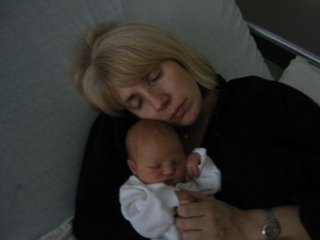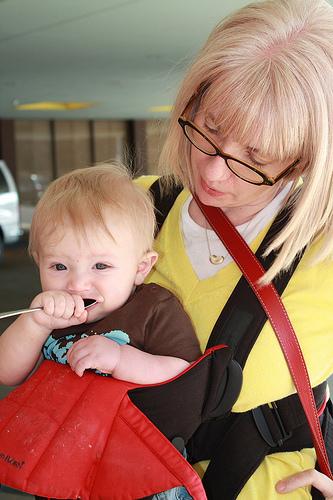It’s Twilight/New Moon/Oh Hey Vampires And Werewolves Day on the Internets (well, maybe yesterday was, but I’m a sleep-deprived mother of two and so I get some creative leeway with my calendar): the release of the movie New Moon yesterday has unleashed, over recent weeks, waves of virtual commentary about the Twilight phenomenon and culminated, today, in a tsunami of red carpet photo coverage. So, you know, if you want to indulge in a little Edward-gazing, today’s your day. I don’t have any red carpet photos of the New Moon premiere, but I do have some reflections on the Twilight series (originally composed for MamaPop last year, when the first movie was released), and why it’s simply not as bad as – and, in fact, probably much, much better than – the naysayers say it is.
Read on…
It was to be expected that there’d be a certain amount of criticism
directed toward the Twilight series after the movie was released. There
was, after all, a considerable amount of criticism of each of the books
as these were released, criticism that was largely directed toward the
purportedly anti- or un-feminist sensibilities of the series. Bella is
a passive character, the argument goes: Bella sacrifices too much for
love; Bella sublimates herself to Edward; Bella doesn’t kick ass and
take names like Buffy did; Bella washes too many dishes for her dad;
Bella wears too much fleece, etc, etc.
Whatever. The quote-unquote feminist arguments against the Twilight
series are specious at best, in my opinion (I mean, for example: Bella
passive? Bella risks her own life on numerous occasions to save people.
Bella saves EVERYBODY at the end. And she’s not even a Slayer. *rolls eyes*),
but nonetheless frustrating. I actually wrote a whole post ranting about how being cynical about love is the new black and
how stupid it is – yeah, I called it stupid – to call out romantic love
as de facto disempowering, even when the love at stake (heh) is love
between a clumsy human girl and a powerful vampire, especially seeing
as that clumsy human girl basically makes that vampire her bitch and makes him do whatever she wants.
But then I realized that long lectures on the place of romantic love
in the history of feminist discourse and consideration of same against
current critiques of Twilight were maybe not so interesting to a
community of readers who are probably just looking for something lite
to read while they scarf down their afternoon Snickers bar, and so I
shelved it.
Then I read this (warning – some spoilers follow):
Is the Twilight series pushing its own kind of morality along
with its love story? I think so — and it is an element that parents and
teachers need to be aware is in the books. The narrative suggests that
it is better to submit and sublimate yourself to a superior being than
to be your own person. Having a will of one’s own is not conducive to
Meyer’s brand of love and living. Only heterosexual relationships are
explored, and (married!) sex is always a power play with painful
consequences. Plus it is preferable to be a teenage mother above all
else, even if it kills you. (io9.com)
Let’s break this down:
1) The narrative suggests that
it is better to submit and sublimate yourself to a superior being than
to be your own person.
This canard is getting old. How is Bella not her own person,
exactly? She falls in love and fights – fights hard – to carve a space
in this world for that love. She fights Edward – who worries
about her life and her future and her breakability – in her pursuit of
this love. And she gets what she wants, against all of Edward’s initial
preferences. She joins Edward’s world, sure – but doesn’t that happen
for many of us when we align our lives with someone else’s? We follow
partners as their lives take different directions, and they follow us.
Since when is sacrifice in the name of love an incontrovertibly bad
thing? If Bella left her family and gave up her college plans (which
she wasn’t keen on to begin with) to go do community work in
sub-Saharan Africa, would we be all oh, she’s just sublimating herself to community work? Why does love necessarily mean sublimation? SERIOUSLY.
And this ‘superior being’ bullshit? It’s bullshit, for two reasons:
one, as I suggested above, Edward is not a superior being. He’s an
angst-ridden, self-flagellating monster-boy. I think that part of the
force of Meyer’s narrative lays in the fact that Edward’s beauty and
strength conceal vast reserves of self-doubt and – in some moments –
self-loathing. He’s a monster, and he hates that he’s a monster. It’s
Bella who brings to full flower his determination to fully overcome his
animal side; it is Bella who overrides his tendency to self-doubt.
Who’s the superior being?
Two: as I argued here,
the idea that a remarkably ‘good’ character is a troubling romantic
partner is, well, troubling. Why shouldn’t we (or our children) aspire
to love really good people, people who would love us as well as Edward
loves Bella?
2) Having a will of one’s own is not conducive to
Meyer’s brand of love and living.
Huh? See above.
3) Only heterosexual relationships are
explored, and (married!) sex is always a power play with painful
consequences.
Right. Because all novels should
explore homosexual relationships, just because. They should also take
care to ensure that characters represent a range of ethnic and class
backgrounds and abilities. Writers should be encouraged to include
seeing and hearing-impaired characters, and also characters in
wheelchairs. Down with heterosexist, ableist, racist, classist
storytelling!
(Wait. The Twilight series does have characters from a
range of backgrounds! And a character in a wheelchair! And depending
upon how you read those two Romanian vampires who appear in Breaking
Dawn, there’s a case to be made that homosexual relationships are not ignored. Stephenie Meyer did take Political Correctness In Novel Writing 101! Take that, Tolstoy, you racist, ableist, heterosexist bastard!)
Also, someone’s been reading a bit too much Catherine Mackinnon.
That whole ‘all sex is rape/all sex is violence’ line is so last
millenium. Sex is dangerous for Edward and Bella because Edward is –
wait for it – a vampire. That there’s a risk of him eating Bella during the act doesn’t speak so much to a power play as it does to, you know, his diet. And Bella’s the aggressor, remember? If anyone is pulling power moves v.v. sex in their relationship, it’s Bella.
4) It is preferable to be a teenage mother above all
else, even if it kills you.
This is the one that I find most baffling and infuriating. It
reduces Bella’s desire to protect her unborn child to a desire to be a
teenage mother. That’s just stupid. Bella didn’t set out to get
pregnant; she didn’t pursue teenage motherhood. She got pregnant and
decided to keep the baby. Oh, hey, maybe you’ve seen Juno? She preferred teenage motherhood above all else, too!
The writer argues that because Bella refuses an abortion, the book
is “a virtual pro-life P.S.A.” and that Meyer is forcing ‘anti-abortion
hysterics” upon her readers:
The too-predictable plotline would be bad enough without statements
like this from Bella: “This child, Edward’s child, was a whole
different story. I wanted him like I wanted air to breathe. Not a
choice — a necessity.” Never mind that Bella, 18, had never wanted
children and had been arguing with her husband about going to college,
which he summarily dismissed.(Ed. note: that last parenthetical statement is just wrong. Edward
does everything in his power to convince Bella to go to college. She’s
the one who resists.)But then bad Edward wants to give Bella an abortion because he knows
their half-vampire/human baby will kill her! “He
leaned away and looked
me in the eye. ‘We’re going to get that thing out before it can hurt
any part of you. Don’t be scared. I won’t let it hurt you.’ ‘That
thing?’ I gasped…Edward had just called my little nudger a thing.
He said Carlisle would get it out. “No,” I whispered.” You see, Bella
often refers to her unborn child as “her little nudger,” since it grows
inside her at an unnatural rate. Yes, she does.
Apparently,
it is just the most insidious and troubling thing EVER that Bella
becomes attached to her unborn child. Because, you know, that never
happens! ALL accidental pregnancies are supposed to end in abortion,
because if you were ambivalent about becoming a mother before you got
knocked up, you should just stay ambivalent, and ambivalence = being
anti-baby, so seriously, you should just flush that thing out and
forget it ever happened. That’s why Juno was such a bad movie; it was so unrealistic.
Also, pregnant women never name their unborn babies, and would never
risk their lives to protect them! Because abortions are awesome, and we
like to keep our abortioning options open until the last minute! NEVER
GET ATTACHED TO A FETUS, is what I always say.
GAWD. This is the shit that makes pro-choicers (which I,
emphatically, am) look bad. Deciding against abortion doesn’t make you
rabidly anti-choice or even anti-abortion. It means that you want to
keep your baby. Last time I checked, that wasn’t a reprehensible thing.
Look, you don’t have to like the Twilight books. If they’re not your
thing, if you don’t find them convincing, that’s your opinion and
that’s fine. I mean, they’re not going to end up on any Great Books
list alongside Shakespeare, so you don’t need to worry about Edward and
Bella being canonized as the second coming of Romeo and Juliet. The
march of Great Literature will continue, helped along by the
publication of the latest variation of The Jane Austen Book Club or
whatever it is that Oprah is putting her stamp on these days and
literacy will not get hurt. But please: resist the urge go all Savonarola
on the Twilight books, with preachy denunciations of its troubling
morality and insidious teachings. What makes your insistence that
‘parents and teachers should be made aware’ and readers ‘forewarned’
that the content of these books is potentially ‘dangerous’ any better
than any other censor’s self-righteous attempt to get the books they
deem ‘troubling’ put behind the library check-out counter?
And if not, at least come up with more sophisticated criticism. My eyes get tired from all the rolling.
(You can read the companion piece to this post – Five Reasons Why You Should Totally Let Your Kids See Those Vampire Movies – over at Her Bad Mother. And you can see the discussion prompted by the original version of this discussion over at MamaPop. And then you can go see New Moon. Or go surf entertainment blogs in search of photos of Robert Pattinson at last night’s premiere. Enjoy!)

